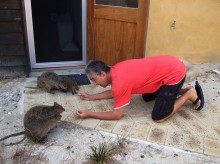 Here’s some powerful writing from one of our bloggers on Wired In To Recovery when it was running between 2008 and 2012.
Here’s some powerful writing from one of our bloggers on Wired In To Recovery when it was running between 2008 and 2012.
‘Most people have heard the words ‘monkey on my back’ used as a term for defining addiction. Personally, I find the word ‘addiction’ too soft a word to describe the monster every addict or alcoholic battles in daily life. It’s too clinical, too sterile, and just doesn’t pack the same punch as the monkey analogy.
As a hardcore alcoholic for more than half my life, I learned a few things about the monkey.
First, he never knows when to keep his mouth shut. It’s not that he’s loud. In fact, it’s quite the opposite. The monkey prefers to whisper, at least during the early stages of addiction.

 Andy Partington’s new book,
Andy Partington’s new book,  Here is the section ‘Overcoming Stigma’ in my article
Here is the section ‘Overcoming Stigma’ in my article  This article is the follow-up to the
This article is the follow-up to the  This is the first of two blog posts on the culture of addiction that I first uploaded to the website back in 2013. They are strongly based on the seminal writings of William (Bill) White, in particular from his stimulating book
This is the first of two blog posts on the culture of addiction that I first uploaded to the website back in 2013. They are strongly based on the seminal writings of William (Bill) White, in particular from his stimulating book  Here is a powerful
Here is a powerful  During the many years I spent working in the addiction and mental health field, first as a neuroscientist and later (2000-2008) in the UK helping empower people to facilitate their recovery (healing), I rarely heard the word ‘trauma’ being used.
During the many years I spent working in the addiction and mental health field, first as a neuroscientist and later (2000-2008) in the UK helping empower people to facilitate their recovery (healing), I rarely heard the word ‘trauma’ being used.
 On Sunday, I uploaded
On Sunday, I uploaded  The Recovery Stories on this website were written in 2012, ready for our launch in 2013. Some of these Stories were written by the person, whilst others I wrote after interviewing the person (or people) on a number of occasions. In these latter cases, the stories went back and forth across the world, as most involved people lived in the UK and I had moved to Australia.
The Recovery Stories on this website were written in 2012, ready for our launch in 2013. Some of these Stories were written by the person, whilst others I wrote after interviewing the person (or people) on a number of occasions. In these latter cases, the stories went back and forth across the world, as most involved people lived in the UK and I had moved to Australia.
